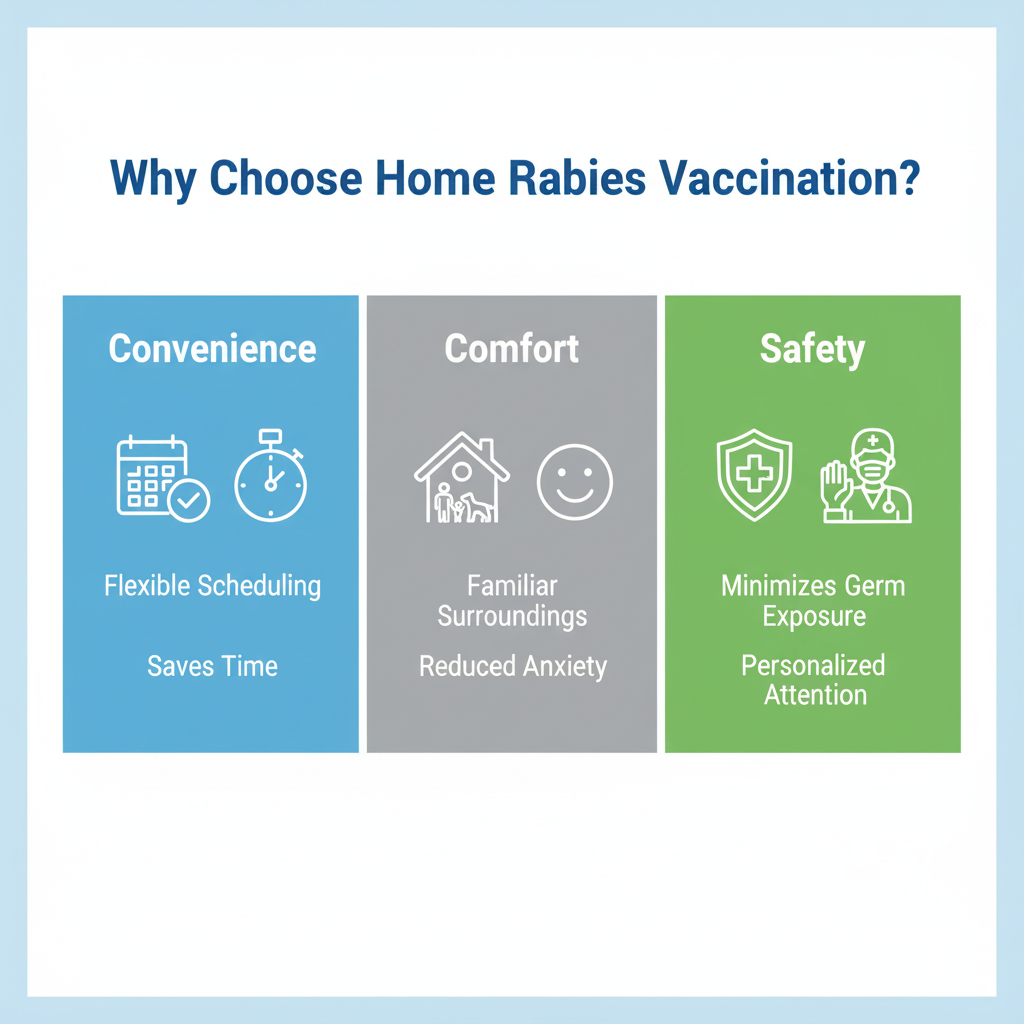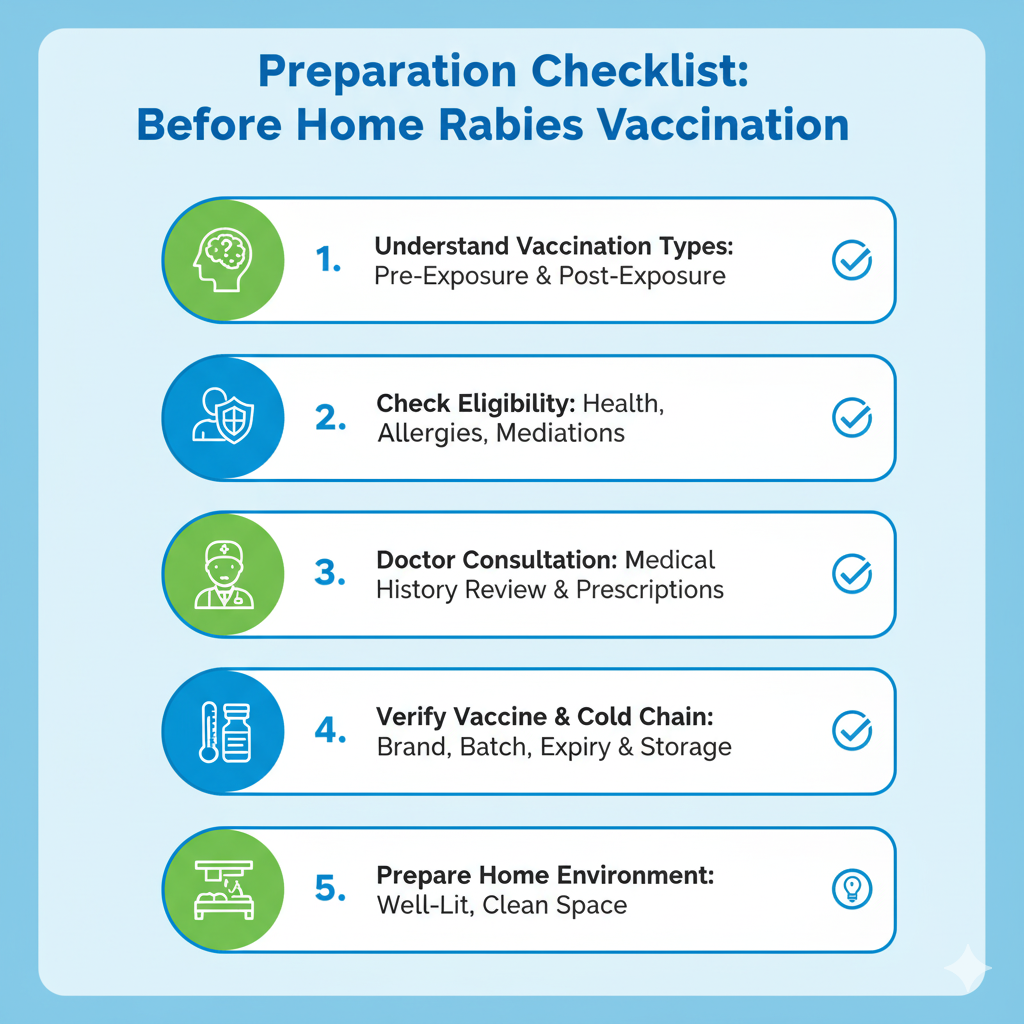Getting ready for a home rabies vaccination can make the process smoother and help you feel more confident. Rabies is a serious disease, but at-home care lets you protect your health in an environment you know This guide walks you through what to expect, how to prepare, and why many families in India trust Dr. Morepen Home for safe, reliable rabies vaccination at home.
Why Choose Home Rabies Vaccination?
Home rabies vaccination keeps things simple. There’s no need to fight traffic or wait in crowded clinics. The medical team comes right to your door. This means care happens on your time, in your own space.

Convenience and Comfort for Patients
- Choose the best time for your schedule.
- Stay where you feel at ease.
- Children and older adults benefit from familiar surroundings.
When Is At-Home Vaccination Recommended?
- After any animal bite, quick action is needed.
- People in high-risk jobs or those traveling to areas where rabies is common.
- Those with health issues that make going outside difficult.
Suitable Age Groups and Profiles
- Suitable for adults, seniors, and most children.
- Always confirm eligibility with your healthcare provider.
Benefits Compared to Clinic Visits
- Lowers risk of catching other infections.
- Family members can offer comfort.
- Health professionals can focus more attention on the patient.
Potential Limitations and Concerns
- Emergency help may be slower if something rare goes wrong.
- Some people with complex needs may still need in-clinic care.
Preparation Before the Rabies Vaccination Appointment
Good planning helps the appointment go smoothly. Keep these points in mind before your home visit.

Understanding Vaccination Types (Pre-Exposure & Post-Exposure)
- Pre-exposure: Helps protect people who might be exposed to rabies through their work or life situation.
- Post-exposure: Given after a bite or scratch from an animal that could have rabies.
Checking Eligibility (Health, Allergies, Risk Factors)
- Tell your doctor about any allergies or health problems.
- Share a list of any medicines you take.
Doctor Consultation and Required Prescriptions
- A registered doctor reviews your medical history before giving the go-ahead.
- The right paperwork is needed for at-home care.
Verifying Cold Chain & Vaccine Storage
- Vaccines should be kept cold during transport.
- Confirm the vaccine’s brand, batch number, and that it’s within the expiry date.
Preparing the Home Environment for Safe Administration
- Pick a room with enough light and space.
- Clean the area where you’ll sit or lie down.
Home Rabies Vaccination: The Step-by-Step Checklist
Make sure you don’t miss anything by following this simple checklist.
Essential Supplies and Equipment List
- Rabies vaccine (check the vial and label)
- Sterile syringes and needles
- Gloves, masks, hand sanitizer
- Bandages and cotton swabs
Hygiene and Safety Setup (Sanitization, Gloves, Masks)
- Everyone should wash hands before and after.
- The nurse or doctor wears gloves and a mask.
- Used items are safely disposed in medical waste bags.
Role of Family Members and Caregiver Support
- Help keep children calm.
- Assist with paperwork or providing water if needed.
Confirming Doctor or Nurse Credentials
- Ask for an ID card before letting anyone in.
- All visiting staff should look professional and polite.

Pre-Vaccination Instructions (Food, Hydration, Current Medications)
- Eat a light meal unless the doctor says otherwise.
- Stay hydrated.
- Have doctor-approved medication lists ready.
Administration Process: What to Expect
Rabies vaccination at home follows strict standards for your safety.
Stepwise Procedure for Intramuscular/Intradermal Vaccination
- The medical worker cleans a spot on your upper arm or thigh.
- The vaccine is injected quickly and gently.
- The area is covered with a dry cotton swab or small bandage.
Pain, Discomfort, and Typical Reactions
- The area might sting for a few seconds.
- There can be mild swelling or redness for a day or two.
Monitoring for Immediate Side Effects
- The nurse or doctor stays for 15-20 minutes after the shot.
- They watch for rare allergic reactions like swelling or redness.
Emergency Response Readiness (Anaphylaxis Protocol)
- Providers bring along medicines for emergency use, just in case.
- Staff are trained for quick action if anything unexpected happens.

Aftercare: Monitoring and Managing Side Effects
Caring for yourself after a vaccine is just as important.
Common Post-Vaccination Symptoms
- Fatigue, low fever, and muscle soreness may appear.
- These usually clear up in a day.
Allergic Reactions and When to Seek Help
- Sudden, severe swelling, rash, or trouble breathing need fast medical attention.
- Tell your provider about any unexpected symptoms.
How to Track Vaccination Doses & Follow-Up Schedule
- Keep a dated list of vaccine doses.
- Ask for an official record for future reference.
Keeping Vaccination Records and Certificates
- Store vaccination cards in a safe place.
- Take a photo with your phone in case you need a backup.
Conclusion
Preparing for a home rabies vaccination offers an effective path to protecting yourself and your family without the stress of visiting a clinic. Trusted companies like Dr. Morepen Home provide certified professionals and follow strict safety standards for every appointment. Rabies vaccination at home suits adults, seniors, and children, as long as proper medical review is conducted. With thoughtful planning - from choosing the right vaccination type to managing aftercare - patients feel comfortable and supported through each step.
Frequently Asked Questions (FAQ)
1 Does insurance cover home rabies vaccination?
Coverage varies by provider and policy. It's important to check with your insurance for details about home healthcare and vaccination reimbursement.
2 Who should consider rabies vaccination at home?
Anyone exposed to potentially rabid animals or those who work, travel, or reside in high-incidence areas can benefit. Children, elderly, and patients unable to visit clinics may find at-home vaccination especially helpful.
3 Is the rabies vaccine safe and effective at home?
Rabies vaccines are highly effective when given at the right dose and time. Intradermal and intramuscular methods are both safe; modern cell-culture vaccines are recommended over nerve tissue versions.
4 Can I experience side effects after the rabies vaccine?
Side effects are typically mild such as soreness, headache, or low fever. Severe allergic reactions are rare, but any concerning symptoms should be reported immediately to the provider.
5 What should I do if I missed a dose or a follow-up appointment?
Contact your medical provider promptly. They will guide you on the next best steps to stay protected.
6 Does the vaccine offer lifelong protection?
Vaccines provide strong protection for 1-2 years. Booster doses might be needed for those at constant risk, and antibody testing is recommended for specific cases.
7 Will vaccination at home protect pets too?
Home rabies vaccination services for pets depend on local regulations and veterinary guidelines. Pet owners should consult veterinarians for the right options.
.png)


.png)
.png)
.png)
.png)
.png)
.png)
.png)
.png)
.png)
.png)
.png)
.png)
.png)
.png)
.png)
.png)
.png)
.png)
.png)
.png)
.png)


.png)
.png)
.png)
.png)
.png)
.png)
.png)

.png)
.png)
.png)

.png)
.png)
.png)
.png)
.png)
.png)

.png)
.png)

.png)
.png)
.png)

.png)

.png)


.png)







